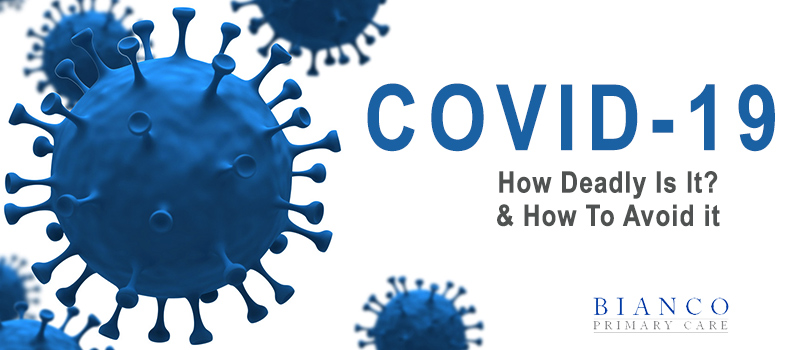The good news here is that the virus is not very deadly from an epidemiological standpoint. The overall death rate (including asymptomatic patients) is certainly less than 1%. That means if you get this virus you have greater than 99% chance of surviving!! I will take those odds😀. A word of caution: that is an average rate and those in certain “high risk” groups have higher rates. The high-risk groups include age over 60, those with obesity, diabetes, high blood pressure, heart disease, lung disease and high inflammatory markers (CRP or sed rate). In those cases, the rate is around 1.4%.
The best news is that COVID-19 is rarely affecting our children and even more rarely do they get severe illness or death and many times less frequently than with the flu. Recent studies have also shown that children are not spreading the virus from themselves to adults.
For most healthy individuals, if infected, you can expect 3-5 days of feeling miserable (flu-like symptoms) followed by recovery. Certainly, those who are at high-risk could develop more severe symptoms, require hospitalization and have post-infection complications or even death. Know where you fall in the risk continuum and take the appropriate precautions.
If you want to know if you are high risk and what extra precautions you can take, please read our article ” Am I high risk for sever case of COVID-19″
Of course the best course of action is to avoid getting infected with COVID-19. Here I address the four primary questions patients ask in that regard.
1) Do masks stop the spread?
The answer here is it all depends. If used properly and it is a quality mask, it can offer some protection for the wearer. There is a lot of discussion on this in the media and governments as well as businesses are requiring masks to be worn. A mask can help but is far from the 100% shield people have thought. For more details including studies addressing the effectiveness of masks, please read our article “Do Masks Stop The Spread of COVID-19”.
2) Can an asymptomatic person spread the virus?
While there is not yet a definitive answer from current research, it seems asymptomatic people do not spread the virus. There is evidence that a pre-symptomatic individual does probably have enough virus replication to “pass it on” but less so than someone with overt symptoms.
A pre-symptomatic individual would be someone who is infected with the virus, but 1-2 days before symptoms appear. To be infected by such individuals it would require close and extended contact. I know it sounds like what I said is just semantics but there is a real difference between asymptomatic (been exposed and develop antibodies but never have symptoms at all) and pre-symptomatic (the 1-2 day period before you start having symptoms).
We know that with all infections, the more virus in your body the more contagious you are. The more virus you have the more symptoms you have as well. If you do not have symptoms then that means you have a low viral load (your body is fighting the virus effectively enough to keep its population low).
Because we have no way to tell the difference between asymptomatic, pre-symptomatic and healthy individuals, the best practice is to avoid close and extended contact with others outside your home. Wash your hands frequently and avoid touching your face or eyes. If you are in the high-risk group, wear a mask if you are unable to social distance.
3) Does the virus live on surfaces?
Viruses do not normally live on a surface long enough to be a vector for spread and this coronavirus does not seem to be any different. While technically you may be able to find some virus on a surface in the lab for many days, it is not clinically relevant as it weakens quickly and is therefore not potent enough to cause illness.
In college, we tested this theory in the lab and I so vividly remember this experiment. Our whole class of 20 or so students put a glove on and then formed a line to each take a turn touching the doorknob to the classroom that our professor had expertly coated with germs!! We then took our gloves back to our station and ran a culture of what was on the glove. The first 20 students who touched the doorknob found germs on their gloves. However, the amount of germs on the first glove was vastly more than on the 20th glove.
So while technically the germs were on all gloves, practically only the first few gloves carried enough of them to get someone else sick. The longer the time period between contamination of the door to the transmission to the glove, the less likely transmission and infection would occur, as the virus is unable to live long outside the body. This is why frequent hand-washing or sanitizing is so important, you never know where you are in the line—number 1 or number 20!
In short, in order to get the virus from a surface someone would have had to very recently coughed or sneezed and then touched that surface (gas pump, shopping cart, door handle, etc) and then you have to come along shortly behind them, touch the surface, and then touch your mouth or nose or eyes. This reaffirms the need to keep your hands clean and don’t touch your face while in public spaces.
4) Do gloves help or should I just wash my hands?
I do not think gloves help at all and are far inferior to a good hand washing or use of sanitizer. Gloves will pick up the virus the same as your bare hands but since you can’t wash gloves they are the perfect way to get yourself sick if you don’t change them constantly.
You are much better off just being diligent in washing your hands frequently or bringing hand sanitizer with you and using it after leaving stores or pumping gas, as examples. If you do decide to wear gloves, remove them before touching any other surface (your car door, steering wheel, car keys, cell phone, purse) and sanitize your hands. If you do not remove, dispose then sanitize prior to touching something else, then you have just contaminated your personal property and negated any benefit you might have received from the gloves.
Of course isolation is the safest way to avoid contracting the coronavirus, but that is simply not very possible in the world we live. With the information provided here, you should be able to live a fairly normal life and avoid getting Covid-19.


